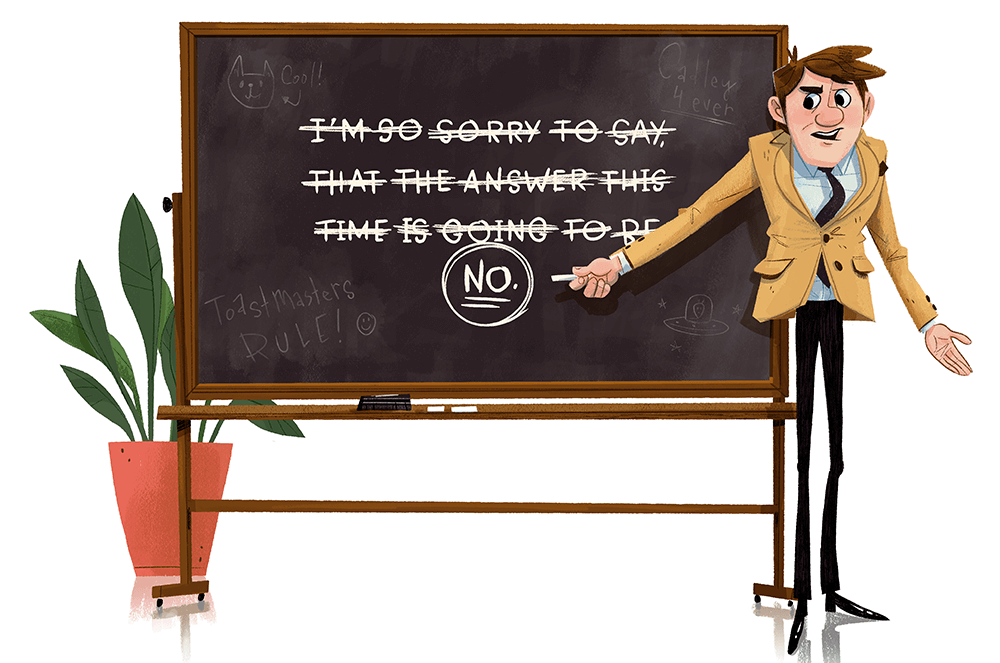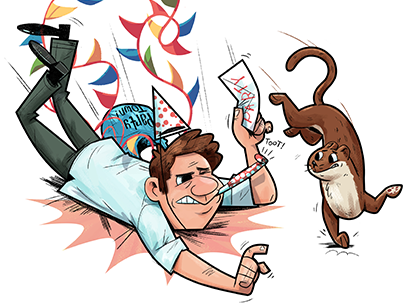
In my years observing homo sapiens, I’ve noticed that humans rarely say exactly what they mean. Speaking with unalloyed confidence is viewed as socially unattractive. You can be confident. You can be very confident. But you can not be supremely confident without creating the impression of omniscience, a quality reserved for a higher order of being altogether. It puts you in the “He thinks he’s God” category. You don’t want to be there … even if you happen to think it’s true. Especially if you think it’s true.
People don’t want to go “all in,” either. Saying something with lapidary precision leaves no possibility of a disclaimer should the words you have spoken turn out to be stupendously stupid.
Take “no,” for example. Two letters, one syllable, and a nanosecond of work by the larynx to vocalize the sound. Yet we never hear a stark naked “no.” It always comes in camouflage clothing: “Gee, I really hate to say no but …” Or, “I’m afraid I’m going to have to say no.” Or, “In a word, no” (that’s four words but who’s counting?). The only time we do hear no in its bare, monosyllabic simplicity is when our parents say it to us as children, signifying that we can’t have something we want. This classifies our parents as mean people. Nobody wants to be a meany. So we try to be a nice meany.
Or let’s say you don’t like something. The shortest route to expressing that sentiment is “I don’t like it.” Instead, we choose the long way home: “Not exactly my cup of tea,” for instance. Or, “Not too crazy about it.” Really? Just how not crazy are you?
Then there are the myriad answers to “How are you?” You might say, “Oh, I guess I can’t complain.” … “Not too bad.”… “Keepin’ it between the lines.” … “Well, I’m still vertical.” Clever phrasing but no substance, and we all know why: When people ask how you are, they don’t want to know.
We even play these word games when there’s nothing to be gained. You tell your spouse, “I’m going to the store.” Distracted, he or she asks, “What did you say?” You reply, “I said I’m going to the market in the village to get some milk.” That’s not what you said. You said five words the first time and 14 different words the second time. What’s going on here? Why do we never repeat exactly what we said?—e.g., “I’m going to the store.” “What did you say?” “I said I’m going to the store.”
If all we ever say is “Yes,” “No,” and “I love you,” there will be a lot of silence in between.
What’s wrong with that? A lot, actually. “I said I’m going to the store.” Hear that sentence in your mind. Listen to it carefully. Does it carry a certain … tone? Does it say: Why do I have to repeat myself? Why don’t you ever listen to me? Why do I have to explain myself? What—do you think I’m not going to the store? You don’t trust me now? Where do you think I’m going? Maybe my mother was right.
If a slight rephrasing of the statement can avoid all that, I’d say it’s worth it.
It’s particularly vexing to see this excess in people who should know better, such as the English author George Eliot, who opens her famous homage to friendship with, “Oh the comfort—the inexpressible comfort—of feeling safe with a person.” First, it’s comfort, then it’s inexpressible comfort. Is this the first draft?
Or what about The New York Times editors who give us this headline: “There’s a Reason There Aren’t Enough Teachers in America. Many Reasons, Actually.” Yes, and too many words to say it. Why not just “There Are Many Reasons …”? If it’s for dramatic effect, I would say the newspaper itself provides enough drama sufficient to the day.
Allow me to close with the three most important words in any language: “I love you.” So easy to say, and yet … so hard. Substitutes abound: “You’re my everything.” … “The light of my life.” … “My sunshine.” … “You complete me.” … “You’re my angel.” … “My heart is yours.” And so on.
Just say it! We can’t—or we won’t. If all we ever say is “Yes,” “No,” and “I love you,” there will be a lot of silence in between. Silence is awkward. It’s a void, a vacuum, and nature—not to mention people—abhors a vacuum. Even space, a near vacuum, is filled with gas, dust, and winds of particles. Is that what we’re doing—filling our social interactions with gas, dust, and wind? I’d rather not say.

John Cadley is a former advertising copywriter, freelance writer, and musician living in Fayetteville, New York. Learn more at www.cadleys.com.






